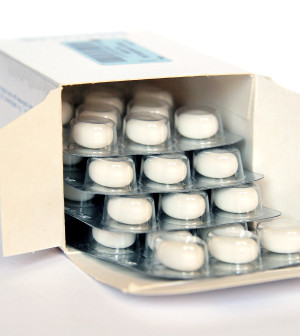- Could Artificial Sweeteners Be Aging the Brain Faster?
- Techniques for Soothing Your Nervous System
- Does the Water in Your House Smell Funny? Here’s Why
- Can a Daily Dose of Apple Cider Vinegar Actually Aid Weight Loss?
- 6 Health Beverages That Can Actually Spike Your Blood Sugar
- Treatment Options for Social Anxiety Disorder
- Understanding the Connection Between Anxiety and Depression
- How Daily Prunes Can Influence Cholesterol and Inflammation
- When to Take B12 for Better Absorption and Energy
- Epsom Salts: Health Benefits and Uses
Study Challenges Salt Guidelines for Kids


U.S. health officials warned last year that nine out of 10 American kids eat more salt than they should, raising their lifelong risk of high blood pressure and heart disease.
But a new study finds that consuming higher-than-recommended amounts of salt appears to have no ill effect on teenage girls’ blood pressure.
The study, which followed more than 2,000 girls from ages 9 and 10 into early adulthood, also indicates that potassium-rich diets help lower blood pressure.
The study findings — considered potentially dangerous by at least one outside expert — contradict current salt guidelines, said study lead author Lynn Moore, an associate professor of medicine at Boston University School of Medicine.
“The current official Dietary Guidelines for Americans say that salt intake after the age of 2 years should be limited to no more than 2,300 milligrams per day,” she said. “Actual intake levels are much higher, with most Americans consuming close to 3,500 milligrams per day.”
That amount was not shown to raise blood pressure in this study, which ran from the late 1980s to the late 1990s.
“For both blacks and whites, girls who consumed as much as 4,000 milligrams of salt per day or more had the same blood pressure levels as those consuming less than 2,500 mg per day,” Moore said.
Moore, however, isn’t advising teens to consume salt indiscriminately. “I believe in everything in moderation,” she said.
The amount of salt most teens in the study ate was not a problem, Moore said. “If teens are eating a generally healthy diet with a variety of foods in all of the food groups, I would not worry about restricting salt.”
However, she added, “a steady diet of high-salt snack foods that have lots of calories and few beneficial nutrients will not be healthy.”
For the new study, Moore and colleagues looked at the long-term effects of salt and potassium on blood pressure among 2,185 girls ages 9 to 10 who took part in the National Heart, Lung, and Blood Institute’s Growth and Health Study. Food consumption was based on self-reporting, and blood pressure was measured annually for 10 years.
As for teen boys, Moore said, “There is no reason to think that the findings would be different.”
Potassium, which is generally lacking in U.S. meal plans, appears to help lower blood pressure, the study found.
“Most Americans consume far too little potassium, and this nutrient plays an important role in blood pressure regulation, even during childhood,” Moore said.
Eating more potassium-rich foods will likely have long-term benefits for everyone, Moore added. Potassium is found in bananas, raisins and other dried fruits, dairy products, spinach and potatoes, she said.
Some experts question the results of the study, published April 27 online in JAMA Pediatrics.
Samantha Heller, a senior clinical nutritionist at New York University Medical Center in New York City, said the findings fly in the face of other studies that show eating too much salt hurts blood pressure.
“My vote is with the research that shows an association between high dietary salt intake and blood pressure in children,” she said. “Adolescents eating high amounts of sodium are more likely to be eating unhealthy foods … especially compared with fresh fruits, vegetables, beans and nuts.”
Heller said that because this study stopped in 1999, it may not contain the latest information. “Other more recent studies have found that dietary salt intake was associated with increases in blood pressure, especially in overweight or obese adolescents,” she said.
For example, one study found that children ages 8 to 17 who ate the most salt were 36 percent more likely to develop high blood pressure than those who ate the least, Heller said.
Heller added that Moore’s study was funded in part by the National Dairy Council and the Dairy Council of California. “One may wonder how this might have affected the report, since, for example, cheese is high in salt,” Heller said.
Last year, the U.S. Centers for Disease Control and Prevention reported that kids aged 6 to 18 eat 3,300 milligrams of sodium a day, even before salt is added at the table.
“One in six children already has raised blood pressure, which can result in high blood pressure in adulthood, as we know a major cause of heart disease and stroke,” CDC Deputy Principal Director Ileana Arias said at that time. “This is incredibly concerning to us.”
More information
For more about blood pressure, visit the U.S. National Library of Medicine.
Source: HealthDay
Copyright © 2026 HealthDay. All rights reserved.










